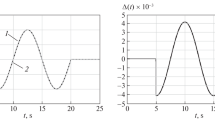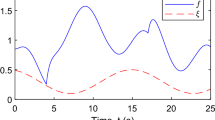Abstract
In this paper, we discuss actuator fault and sensor fault detection and isolation (FDI) problems for a class of switched nonlinear systems with external disturbances. First, an augmented descriptor system is constructed where the augmented state vector consists of the original states, the actuator faults and sensor faults. Secondly, a specific transformation, which transforms the descriptor system into a general system, is made and the relationship between the preconditions relative to these two kinds of systems are discussed in detail. Thirdly, based on the equivalent general switching system, a sliding mode observer which is robust to external disturbances and sensitive to both actuator and sensor faults is designed. Furthermore, based on the proposed fault detection method, a fault isolation method which can isolate the actuator faults from sensor faults is developed by using multiple observer design techniques. Finally, a numerical example is given to illustrate the effectiveness of these methods.
Similar content being viewed by others
References
W. X. Han, Z. H. Wang, Y. Shen, and Y. P. Liu, “H−/L∞ fault detection for linear discrete-time descriptor systems,” IET Control Theory and Applications, vol. 12, no. 15, pp. 2156–2163, 2018.
X. M. Zhang, F. L. Zhu, and S. H. Guo, “Actuator fault detection for uncertain systems based on the combination of the interval observer and asymptotical reduced-order observer,” International Journal of Control, vol. 93, no. 11, pp. 2653–2661, 2020.
J. C. Zhang, F. L. Zhu, R. K. Hamid, and F. N. Wang, “Observer-based sliding mode control for T-S fuzzy descriptor systems with time-delay,” IEEE Transactions on Fuzzy Systems, vol. 27, no. 10, pp. 2009–2023, 2019.
T. Youssef, M. Chadli, H. R. Karimi, and R. Wang, “Actuator and sensor faults estimation based on proportional integral observer for TS fuzzy model,” Journal of the Franklin Institute, vol. 354, pp. 2524–2542, 2017.
Y. Shen, H. Y. Yang, and O. Kaynak, “Sliding mode observer-based FTC for markovian jump systems with actuator and sensor faults,” IEEE Transactions on Automatic Control, vol. 62, no. 7, pp. 3551–3558, 2017.
F. Xu, J. Tan, X. Wang, V. Puig, and B. Liang and B. Yuan, “Mixed active/passive robust fault detection and isolation using set-theoretic unknown input observers,” IEEE Transactions on Automation Science and Engineering, vol. 15, no.2, pp. 863–871, 2018.
X. Wang, X. Luo, M. Zhang, Z. Jiang, and X. Guan, “Detection and isolation of false data injection attacks in smart grid via unknown input interval observer,” IEEE Internet of Thing Journal, vol. 7, no. 4, pp. 3214–3229, 2020.
Z. H. Zhang and G. H. Yang, “Distributed fault detection and isolation for multiagent systems: An interval observer approach,” IEEE Transactions On Systems, Man, And Cybernetics: System, vol. 50, no. 6, pp. 2220–2230, 2020.
L. F. Gou, Y. W. Shen, H. Zheng, and X. Y. Zeng, “Multi-fault diagnosis of an aero-engine control system using joint sliding mode observers,” IEEE Access, vol. 8, pp. 10186–10197, 2020.
C. Saha and A. K. Singh, “A review article on fault-tolerant control (FTC) and fault detection isolation (FDI) schemes of wind turbine,” Proceeding of the Second International Conference on Microelectronics, Computing and Communication Systems (MCCS), pp. 87–95, 2019.
L. Li, S. Ding, J. Qiu, and Y. Yang, “Real-time fault detection approach for nonlinear systems and its asynchronous T-S fuzzy observer-based implementation,” IEEE Transactions on Cybernetics, vol. 47, pp. 283–294, 2017.
L. L. Li, S. X. Ding, J. B. Qiu, Y. Ying, and D. M. Xu, “Fuzzy observer-based fault detection design approach for nonlinear processes,” IEEE Transactions on Systems Man and Cybernetics Systems, vol. 47, no. 2, pp. 283–294, 2017.
D. Du, Y. Yang, H. Zhao, and Y. Tan, “Robust fault diagnosis observer design for uncertain switched systems,” International Journal of Control, Automation and Systems, vol. 18, pp. 3159–3166, 2020.
W. Han, Z. Wang, and Y. Shen, “H — /L∞, fault detection observer for linear parameter-varying systems with parametric uncertainty,” International Journal of Robust and Nonlinear Control, vol. 29, no. 10, pp. 2912–2926, 2019.
J. C. Zhang, F. L. Zhu, R. K. Hamid, and F. N. Wang, “Observer-based sliding mode control for T-S fuzzy descriptor systems with time-delay,” IEEE Transactions on Fuzzy Systems, vol. 27, no. 10, pp. 2009–2023, 2019.
T. Braun, J. Reuter, and J. Rudolph, “A singular perturbation approach to nonlinear observer design with an application to electromagnetic actuators,” International Journal of Control, vol. 93, no. 9, pp. 2015–2028, 2020.
M. Davoodi, N. Meskin, and K. Khorasani, “A single dynamic observer-based module for design of simultaneous fault detection, isolation and tracking control scheme,” International Journal of Control, vol. 91, pp. 508–523, 2018.
J. T. Li, Z. H. Wang, Y. Shen, and Y. P. Liu, “Unknown input observer design for takagi-sugeno systems with fuzzy output equation,” International Journal of Control, Automation and Systems, vol. 17, no. 1, pp. 267–272, 2019.
P. Cairoli and R. A. Dougal, “Fault detection and isolation in medium-voltage DC microgrids: Coordination between supply power converters and bus contactors,” IEEE Transactions on Power Electronics, vol. 33, pp. 4535–4546, 2018.
F. L. Zhu, W. Zhang, J. C. Zhang, and S. H. Guo, “Unknown input reconstruction via interval observer and state and unknown input compensation feedback controller designs,” International Journal of Control, Automation and Systems, vol. 19, pp. 145–157, 2021.
H. Alhelou, M. Golshan, and J. Askari-Marnani, “Robust sensor fault detection and isolation scheme for interconnected smart power systems in presence of RER and EVs using unknown input observer,” International Journal of Electrical Power Energy Systems, vol. 99, pp. 682–694, 2018.
P. Aboutalebi, A. Abbaspour, P. Forouzannezhad, and A. Sargolzaei, “A novel sensor fault detection in an unmanned quadrotor based on adaptive neural observer,” Journal of Intelligent and Robotic Systems, vol. 90, pp. 473–484, 2018.
A. Abbaspour, P. Aboutalebi, K. K. Yen, and A. Sargolzaei, “Neural adaptive observer-based sensor and actuator fault detection in nonlinear systems: Application in UAV,” ISA Transactions, vol. 67, pp. 317–329, 2017.
R. Mohajerpoor, H. Abdi, and S. Nahavandi, “On unknown-input functional observability of linear systems,” Proc. of American Control Conference Palmer House Hilton, pp. 3534–3539, 2015.
R. Mohajerpoor, H. Abdi, and S. Nahavandi, “Partial state estimation: A new design approach,” Proc. of International Conference on Control, pp. 752–757, 2014.
F. Arrichiello, A. Marino, and F. Pierri, “Observer-based decentralized fault detection and isolation strategy for networked multirobot systems,” IEEE Transactions on Control Systems Technology, vol. 23, no. 4, pp. 1465–1476, 2015.
M. R. Davoodi, K. Khorasani, H. A. Talebi, and H. R. Momeni, “Distributed fault detection and isolation filter design for a network of heterogeneous multiagent systems,” IEEE Transactions on Control Systems Technology, vol. 22, no. 3, pp. 1061–1069, 2014.
M. T. Raza, A. Q. Khan, G. Mustafa, and M. Abid, “Design of fault detection and isolation filter for switched control systems under asynchronous switching,” IEEE Transactions on Control Systems Technology, vol. 24, no. 1, pp. 13–23, 2016.
D. Du, S. Xu, and V. Cocquempot, “Fault detection for nonlinear discrete-time switched systems with persistent dwell-time,” International Journal of Robust and Nonlinear Control, vol. 26, pp. 2466–2474, 2017.
J. Li and J. H. Park, “Fault detection filter design for switched systems with quantisation effects and packet dropout,” IET Control Theory and Applications, vol. 11, no. 2, pp. 182–193, 2016.
Y. Shen, H. J. Gao, J. B. Qiu, and O. Kaynak, “Descriptor reduced-order sliding mode observers design for switched systems with sensor and actuator faults,” Automatica, vol. 76, pp. 282–292, 2017.
Y. J. Hou, F. L. Zhu, X. D. Zhao, and S. H. Guo, “Observer design and unknown input reconstruction for a class of switched descriptor systems,” IEEE Transactions on Systems Man and Cybernetics Systems, vol. 48, no. 8, pp. 1411–1419, 2018.
M. Darouach and M. Chadli, “Admissibility and control of switched discrete-time singular systems,” Systems Science and Control Engineering, vol. 1, no. 1, pp. 43–51, 2013.
M. Nasri, D. Saifia, M. Chadli, and S. Labiod, “H∞ switching fuzzy control of solar power generation systems with asymmetric input constraint,” Asian Journal of Control, vol. 21, no. 4, pp. 1869–1880, 2019.
X. Xie, B. Zang, D. Yue, and M. Chadli, “Robust fault estimation of discrete-time nonlinear plants via a comprehensive partition-based switching scheme,” International Journal of Robust and Nonlinear Control, vol. 40, pp. 6518–65349, 2020.
M. Corless and J. Tu, “State and input estimation for a class of uncertain systems,” Automatica, vol. 34, no. 6, pp. 757–764, 1998.
J. B. Qiu, W. Ji, and M. Chadli, “A novel fuzzy output feedback dynamic sliding mode controller design for two-dimensional nonlinear systems,” IIEEE Transactions on Fuzzy Systems, 2020. DOI: https://doi.org/10.1109/TFUZZ.2020.3008271
G. Wang, M. Chadli, and M. Basin, “Practical terminal sliding mode control of nonlinear uncertain active suspension systems with adaptive disturbance observer,” IEEE/ASME Transactions on Mechatronics, vol. 26, no. 2, pp. 789–797, 2021.
Y. Y. Wang, X. P. Xie, M. Chadli, S. R. Xie, and Y. Peng, “Sliding mode control of fuzzy singularly perturbed descriptor systems,” IEEE Transactions on Fuzzy Systems, 2020. DOI: https://doi.org/10.1109/TFUZZ.2020.2998519
K. Iftikhar, A. Q. Khan, and M. Abid, “Optimal fault detection filter design for switched linear systems,” Nonlinear Analysis: Hybrid Systems, vol. 15, pp. 132–144, 2015.
Author information
Authors and Affiliations
Corresponding author
Additional information
Publisher’s Note Springer Nature remains neutral with regard to jurisdictional claims in published maps and institutional affiliations.
This work is supported by the National Natural Science Foundation of China under Grant 61973236 and 61573256.
Fanglai Zhu was born in Xing’an county, Guangxi province, China, on December 28, 1965. He received his Ph.D. degree in control theory and control engineering from Shanghai Jiao Tong University, Shanghai, China, in 2001. Supported by the Chinese government, he worked with Purdue University, West Lafayette, In, USA, as a Visiting Scholar for six months int the year 2015. Before the year 2007, he was with Guilin University of Electronic Technology(GLIET), GuiLin, China as an associated professor for three years and a professor for two years, respectively. He was honored by the Guangxi local government as one of the 100 Young and Middle-aged Disciplinary Leaders in Guangxi Higher Education Institutions. Because of the excellent research work he has done in GLIET, he wa accepted to join Tongji University(TJU), Shanghai, China, in July 2007 as a Professor. He is the member of Professional Committee of Fault Diagnosis and Safety under Chinese Association of Automation. He was the recipient of the third prize of Natural Science Award of Shanghai Science and Technology in 2011. His research interests include nonlinear observer design, sliding model control, model-based fault diagnosis, fault-tolerate control, and T-S fuzzy models.
Yu Shan was born in Jinghua county, Zhejiang province, China, on June 12, 1991. He received his M.S. degree in the College of Electronics and Information Engineering, Tongji University, Shanghai, China in 2020. His research interest include model-based fault detection and isolation.
Yuyan Tang was born in ZheJiang province, China, in 1996. She is now pursuing a master degree in the College of Electronics and Information Engineering, TongJi University. Her research interests include network control, observer design, fault detection and isolation for T-S fuzzy system, LPV system, nonlinear system, and attack detection for CPS.
Rights and permissions
About this article
Cite this article
Zhu, F., Shan, Y. & Tang, Y. Actuator and Sensor Fault Detection and Isolation for Uncertain Switched Nonlinear System Based on Sliding Mode Observers. Int. J. Control Autom. Syst. 19, 3075–3086 (2021). https://doi.org/10.1007/s12555-020-0618-z
Received:
Revised:
Accepted:
Published:
Issue Date:
DOI: https://doi.org/10.1007/s12555-020-0618-z




